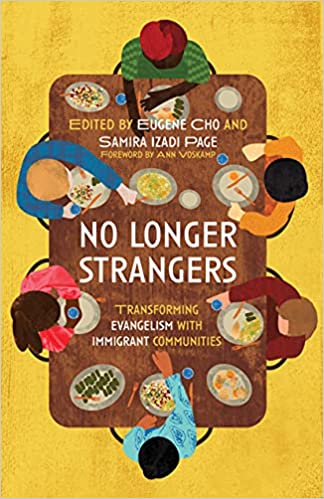A Book Review from Books At a Glance
by Jessie Udall
When engaging in ministry among immigrants, many Western Christians have zeal without knowledge, and they unintentionally end up doing more harm than good. Cho and Page’s book, No Longer Strangers: Transforming Evangelism with Immigrant Communities, is a thoughtful exploration of the complexities of cross-cultural ministry among immigrants, and the blind spots Western Christians may have when interacting with them. Reading this book thoughtfully and prayerfully will go a long way to prepare host nation Christians to engage in evangelism in ways that heal and do no harm to the immigrants with whom they interact.
Chapter 1 captures the raw pain of the displaced by quoting a refugee man in Iraq: “There is no one who cares how I exist, where I exist, or if I exist” (p. xv). This set the tone for the book, which seeks to honor and learn from immigrant voices and to consider the Gospel-implications of the fact that “we are in the midst of the largest mass migration in human history” (p. 8).
Chapter 2 considers trauma-informed methods of evangelism, considering the fact that pressure is particularly harmful to those who have experienced trauma. Chapter 3 is a case study humbly detailing how a church moved from a “ministry to” to a “ministry with” model over years of cross-cultural ministry within their community. Chapter 4 is a call to go beyond mere welcoming to true hospitality, solidarity, and mutuality that goes “beyond an action or task to a shift in our state of being or identity…from doing to being” (p. 68-69).
Chapter 5 ponders what public witness and advocacy on behalf of immigrants might look like for believers, considering how the story of the Good Samaritan and Martin Luther King’s teachings on “transforming” the “Jericho Road” and “restructuring” the “edifice” relate to modern immigration policy (p. 88). Chapter 6 considers, from a refugee’s perspective, some ideas for engaging in “evangelism that reconciles” (p. 107) rather than hurts those with whom we interact. Among other things, the author’s suggestions shift power dynamics so that a true relationship of equals between Western Christians and immigrants from other places is possible.
Chapter 7 is written by the pastor who thought that was doing a decent job of loving their neighbors in the past, but eventually realized that their leadership was actually too often relying on efficient formulas and productivity in ministry while treating people like simple projects rather than the complex image-bearers that they were. In the course of the chapter, the pastor and the church seek to learn to truly love their neighbors by shifting their mentalities and practices in ministry to be more humble and relationally focused. Chapter 8 contains the story of a refugee woman and her advice for engaging in meaningful evangelistic conversations with immigrants that lead to healing after the experience of multiple acute and ambiguous losses.
This book is a timely and needed resource for those who are involved in welcoming immigrants and who want to share the love of Jesus with those with whom they interact, but who are aware that there are many pitfalls when doing so and many ways that they could harm even when their intention was to help. Towards this end, a strength of the book is the many brief “One Person’s Story” sections which serve as case studies of positive or negative evangelistic experiences between people from the host culture and immigrants. These will provide food for thought for individuals or (even better!) fodder for discussion among groups who are seeking to be part of transforming evangelism with immigrant communities together.
Another strength of the book is the diversity and depth of its contributors–there are several immigrant authors and a few host-nation authors who have many years of experience in cross-cultural relationship building, and each author is a true expert in diaspora ministry in his or her own right. Together, they form a kind of advisory dream team for cross-cultural ministry work, and should ideally inspire those involved in helping immigrants thrive to form their own similar diverse and deep teams in their cities as they seek to live out the Great Commission and the Great Commandment in true partnership and mutuality.
This book could have been longer with many more contributors. I was left wanting more, especially as there was not a chapter wrapping up and bringing cohesion to the eight chapters which had gone before. This is not a true criticism of the book, however; simply a statement that the world needs more content like this, and that this book should be the first of many covering issues in diaspora missiology from a multi-cultural perspective.
Jessie Udall
